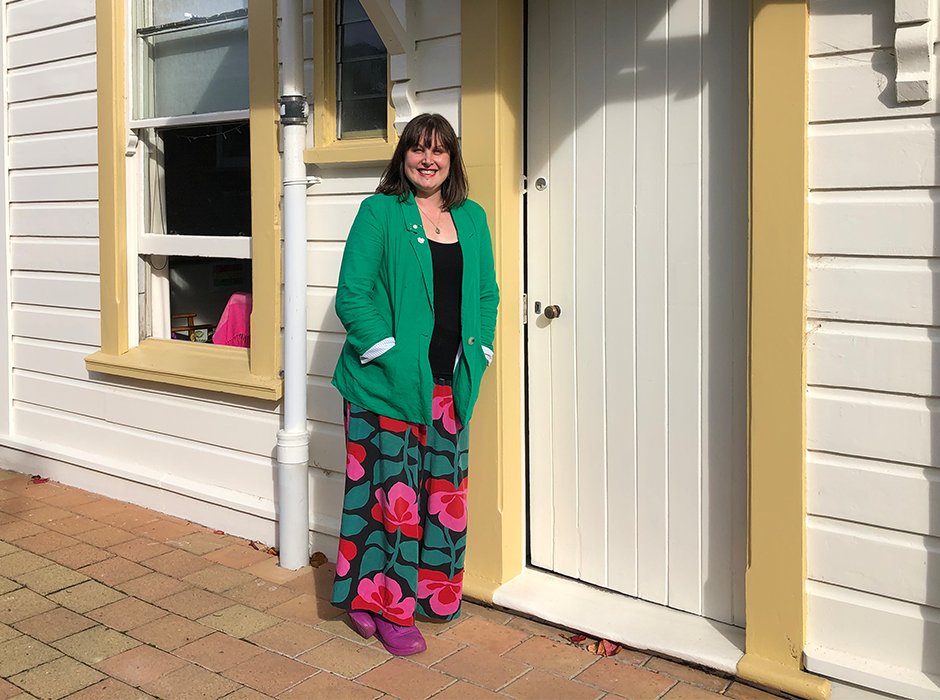
Graduate Wellbeing Coach Nikki Fahey is working to support students with ADHD.
It’s been almost 18 months since Nikki Fahey was diagnosed with attention-deficit/hyperactivity disorder (ADHD) or Aroreretini - meaning 'attention goes to many things'.
Nikki, Graduate Wellbeing Coach at the Graduate Research School began to wonder if she had ADHD after meeting postgraduate students seeking coaching for ADHD. In hearing their stories, she noticed many similarities between their experiences and hers.
“I genuinely felt like they were describing my life – this was unreal.”
Many people – especially women - don’t know they have ADHD, and as was the case with Nikki, they have been misdiagnosed with other things such as depression or anxiety, she says. Research is now showing that women may not present as outwardly hyperactive, and be more internally hyperactive, or have the inattentive subtype, so it is not as readily identified.
“Outwardly, I look like I’m high performing and doing really well. Inwardly, it’s been really hard. [People with ADHD] mask a lot; I don’t want to look like I’m struggling. People pleasing too, it’s much easier to do things for other people than yourself,” she says.
Historically ADHD has been seen as a disorder of childhood, “but what we now know is people don’t grow out of it, they have it into adulthood”.
People with ADHD display a persistent pattern including inattention, impulsivity and/or hyperactivity that is severe and consistent enough to interfere with everyday functioning. These behaviours are due to the way the persons brain works, not due to a lack of intelligence or discipline, Nikki says.
People with ADHD experience executive disfunction where the task doesn’t provide enough stimulation to motivate them to do the task; “this is not rewarding for me because I don’t get dopamine from doing this”.
In response to a growing demand for her coaching service from postgraduate students to help manage ADHD, Nikki started an ADHD Coffee Catch Up in 2022.
Postgraduate students can be “really hard” on themselves, thinking they’re not working hard enough or producing enough.
Postgraduate students with ADHD will be “really passionate” about their topic and be very motivated to learn and do the research, but it can then be hard to then sustain the ongoing focus required to complete the degree when it doesn’t feel novel, or exciting.
It can be hard for supervisors, also, because they’re not seeing any work being produced. Nikki says there are a lot of staff who are “doing cool things” to help students with ADHD, but there are also a lot of supervisors calling her asking for help.
“I think there’s a lot of misunderstanding about ADHD - it’s not that you can’t focus, it’s that you can’t regulate your focus.”
It’s not that people with ADHD don’t want to do things, she says. They are motivated and have goals, but sometimes they “just can’t”. They require a certain level of stimulation to initiate the task, which sometimes comes via medication.
Nikki has done a “deep dive” with librarians to find out what has been written on adults with ADHD undertaking graduate studies. At that time she one PhD thesis on how graduate women feel with ADHD and doing their studies.
“One thesis. That’s it.”
“It’s really hard to tell how many students in the university environment have ADHD.”
A common theme that arises in her coaching sessions is the recognition that high school qualifications and undergraduate degrees tend to be more structured than postgraduate programmes. Research or postgraduate degrees are much more self-directed and require postgraduate students to lead their project and plan their time.
“That’s when people hit problems,” she says.
“If we can understand how to utilise how the brain works and how to provide structure for that in the research space, then people can be really successful.”
Nikki is still learning about ADHD and how to provide support for postgraduate students. One thing she is confident about is the power of community, shared experience and the wellbeing that comes with not having to explain certain traits.
“I love it when I get the chance to meet someone who has ADHD, and you’re like ‘Oh my God! Me too! Me too!’.
“It’s been such a wonderful experience finally feeling like I’m in a group of people that speak the same language as me. It’s like being in our own unique culture and it’s really cool.”
Creating new forms of external accountability has helped.
“I get the most work done if I’m sitting with someone and they’re also doing work with me. That’s how we get it done, with mirror neurons, being with someone else, a shared social expectation that you’re doing your work.”
She’s found getting a whiteboard out and having a verbal brainstorm also helps. She’s collecting these ways of working to share them with everyone.
Nikki is working with the Dean of Teaching and Learning, Tim Cooper, and Dr Bronwyn Lennox Thompson, an academic with ADHD, and others to build a neurodiversity collective for staff and students to empower and support neurodivergent learners and staff. There will be a crowd sourced web page with a range of resources, workshops, events for staff and students to use.
Nikki likes to see neurodivergent researchers conducting research on neurodiversity so that “it’s lived experience stuff”.
Nikki has been with the GRS since 2018 and she will help any university postgraduate student, not just research students.
“You can just rock up with whatever, and we’ll talk about it.”
If you would like to know more about Nikki and her work, or how she can help you, see her profile or please email her Nikki.fahey@otago.ac.nz
If you would like to attend an ADHD Coffee Catch Up or see what other wellbeing workshops are on offer click here